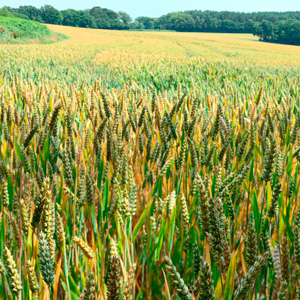Debate: should we grow fuel as well as food?
As the world's growing population demands to be fed, can we justify using land to produce renewable energy instead or would it be better to focus on other green initiatives? By Liz Falkingham

At this time of year, arable landscapes are a promising golden green with young wheat. Despite its beauty, though, this view is increasingly becoming a political battleground when seen through the lens of renewable energy requirements.
As part of an EU-wide target, the UK has committed to generating 15 per cent of its energy from renewable sources by 2020. Wind, solar and waste all have a part to play but to a large extent it is crops such as whea that have been touted as green saviours. The Ensus plant on Teesside, one of the world’s biggest cereal grain biorefineries, currently takes more than a million tonnes of wheat from here and Europe for processing, and, according to the National Non-Food Crops Centre, 50,000-60,000 hectares of UK land were used for the production of biodiesel between April 2010 and March 2011. This involves breaking down the grain’s starch into sugars, which are then fermented into alcohol and carbon dioxide, a process akin to distilling whisky. The protein and other parts are converted into animal feed.
At the centre of the debate are the ethics of using land to grow fuel not food and the question of just how ‘green’ bioenergy crops truly are. Author and climate change expert Chris Goodall is scathing of their environmental credentials: “Bio-petrol was seen as a good way of reducing greenhouse gas emissions and cutting the cost of fuel; it almost certainly does neither and has helped create the pressure on grain prices,” he says. “It’s a disaster for the poor in non-industrial countries, who are seeing prices spike.”
Campaigners point to the fact that crops such as wheat, when grown conventionally, require large quantities of fossil fuel-based inputs (diesel and fertiliser), negating any green benefits. Pressure on land for feed use inevitably means rising costs as well. Michael Wilkinson farms poultry and arable near Thirsk in North Yorkshire, within striking distance of Ensus. He has concerns that grain taken out of the animal food chain for biofuels will push already inflated feed prices even higher. “We produce eggs and crops, so what we lose with one hand we gain with the other – but for those farms that have just poultry or pigs, it is potentially serious,” he says. “Demand from Ensus could put £5 per tonne on feed costs – for a laying unit of 15,000 birds, that’s equivalent to an extra £30,000 on the bill per year.”
Those in favour of biofuels point to the fact that the protein-enriched animal feed created as a by-product reduces the UK farming industry’s reliance on bought-in feeds. It is also argued that the three million tonnes of wheat currently exported from the UK could be retained for domestic use via biofuels, reducing food miles and emissions.
It may be that these arguments become less relevant as technology marches on. Chris Goodall believes algae could hold the key, as most species contain oil, which can be refined for transport fuel.
For biofuels
James Mills is combinable crops adviser at the National Farmers Union (NFU).
'Producing biofuel from grain would provide us not only with energy but also animal feed that we’d otherwise import.
'The biofuels industry is providing food, fuel and feed, while driving needed improvements in agriculture’s productivity and reducing demand for imports. The EU currently has a 20 million tonne deficit of high-quality protein, which is fed to livestock. This demand is mainly filled by importing soya from the Americas. However, the biofuels industry is able to address this imbalance by refining some of the 12 million tonnes of surplus grain exported from the EU, to produce both biofuels and high-protein animal feed. The muddled calls to abolish existing targets for biofuels would undermine the progress the EU has made in reducing its protein deficit. Perversely, with less EU processing, vast areas of land in the Americas and south-east Asia would be brought into use to meet EU demand for soya, palm or livestock products, involving the clearance of ecologically sensitive sites such as rainforest – just what the antibiofuels lobby are campaigning against.
'Discussions about the merits of biofuel production must be based on the realities of modern farming, which responds to market drivers, and not short-term reactions to cyclical price spikes. Given a politically stable environment, biofuels reduce food price volatility and ensure a secure fuel supply.'
Against biofuels
Craig Bennett, director of policy and campaigns at Friends of the Earth.
'The billions spent by European governments on biofuels would be far better used on solutions that are cheaper and don’t harm the environment.
'All car fuel in the UK, including petrol and diesel, is now blended with biofuel. At the moment, 4.5 per cent of our car fuel consists of it, and this is due to rise to five per cent next year. In fact, the overall European target is for biofuel to make up ten per cent by 2020.
'A major problem is that biofuels compete with food crops because they require vast amounts of land and water to produce them. A 2008 study estimated that the area needed to grow enough crops for fuel to meet only a third of that ten per cent target could produce enough wheat and maize to feed 127 million people for a whole year. And there’s more bad news: biofuels aren’t good for the environment because their production results in even more climate-damaging emissions than the dirty fossil fuels they’re supposed to replace. One study has shown that the ten per cent target could lead to 56 million tonnes of extra carbon dioxide per year – the equivalent of an additional 26 million cars on Europe’s roads.
'Billions of pounds are spent annually on biofuels. The Government must scrap its target and instead focus on greener cars, improved public transport, fast and affordable rail services, and incentives to get people cycling and walking.'
Fuels of the future
● Algae fixes carbon dioxide, using sunlight and water, to produce oil, which can then be refi ned for use in transport fuels. The Carbon Trust has an £8 million project running with the target of cultivating 70 billion litres of algae fuel per year by 2030.
● Plant-microbial fuel cell could have the potential to produce electricity 24 hours a day from plants by tapping into the natural interaction between plant roots and soil bacteria. Dutch researchers hope to have ‘green electricity roofs’ up and running by 2015.
● Cellulosic ethanol is based on the already widely used system of producing ethanol from crops such as maize. Its attraction is that it breaks down cellulose in forestry residues and short-rotation woody crops, rather than competing for food crops. More work is needed to make it viable, but the US has a target of producing 16 billion litres per year by 2022.
You might also like...
A century of change: farming
Can changing what you eat save the planet?
See all our rural issues and debates










